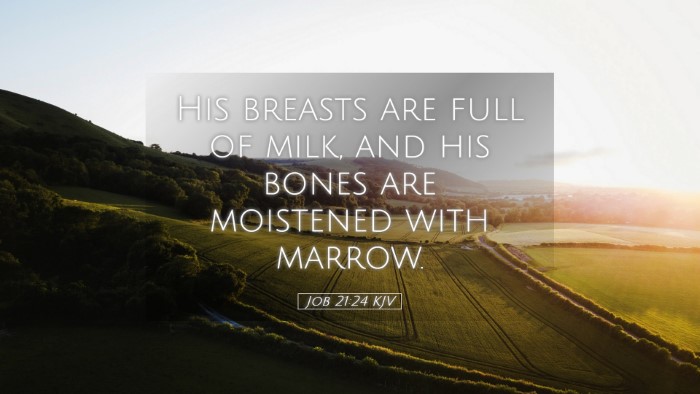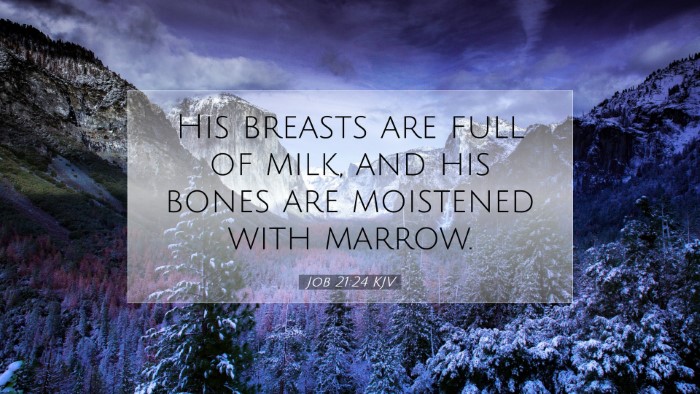Commentary on Job 21:24
Verse: "His breasts are full of milk, and his bones are moistened with marrow."
Job 21:24 is part of a broader discourse where Job articulates his grievances and observations regarding the wickedness of men and the apparent prosperity of the ungodly. Traditional interpretations often view this verse through the lens of material abundance and the illusion of success in a morally inverted world.
Summary of Allegorical Significance
The statement "His breasts are full of milk" metaphorically reflects the abundance and seemingly well-favored state of those who live in wickedness. Job employs this imagery to challenge the theological assumptions that underlie the conventional wisdom of his contemporaries—that prosperity is a direct reward for righteousness and suffering a consequence of sin.
Theological Insights
-
Divine Justice:
The juxtaposition of prosperity with unrighteousness raises significant questions about divine justice. Albert Barnes comments on the apparent disconnect between a righteous God and the observed realities of success among the wicked. This leads to an essential exploration of God’s sovereignty and the ultimate purpose of suffering.
-
Moral Order:
Matthew Henry emphasizes that this verse invites contemplation on the nature of moral order in the world. The prosperity of the wicked challenges the readers to seek understanding beyond superficial temporal observations.
-
Contrast with Righteousness:
Job’s undeserved suffering juxtaposed with the flourishing of the wicked serves to illustrate the complexities of the human condition, often explored by Adam Clarke. Such contrasts compel believers to recognize that immediate outcomes do not faithfully represent one's standing before God.
Literary Context and Its Implications
The context of this verse arises during a profound dialogue where Job pleads for an audience with God regarding his unjust suffering. In this exchange, the imagery of nourishment and vitality becomes poignant, emphasizing the vitality of the wicked while Job himself experiences deep despair. This context contributes to the contrast between physical sustenance and spiritual desolation.
Job's Expectations of God's Judgment
Job anticipates that the righteous ought to flourish while the wicked should reap judgment; hence, this verse serves as a declaration filled with irony and pain. The expectation set forth by moral absolutism is fundamentally challenged, suggesting that the prosperity of the ungodly complicates human perceptions of justice.
Response to Theological Challenges
Theological students and scholars must grapple with the larger implications of Job 21:24. This narrative presents a profound pedagogical opportunity to dissect the notions of prosperity theology, ultimately leading to deeper discussions on grace, mercy, and the nature of suffering as relayed throughout biblical teachings.
Pastoral Applications
-
Empathy in Suffering:
Pastors can utilize Job's plight to counsel congregants who struggle with understanding the nature of suffering. Recognizing that even the righteous may endure pain can facilitate a community of faith that embraces compassion and understanding.
-
Encouragement Amidst Injustice:
This verse provides a powerful framework for encouraging believers to maintain faith in God’s ultimate justice despite apparent inequalities in earthly rewards. The long-term perspective of both earthly existence and eternal implications should enrich pastoral messages.
Concluding Reflections
Job 21:24 invites an intricate examination of the relationship between wealth, morality, and divine justice. It serves both as a poignant reminder of the superficial nature of worldly success and as a challenge to believers who seek coherence in their faith amidst life’s perplexities. In bridging the ancient text to contemporary theological discourse, scholars and practitioners alike can cultivate a more profound understanding of God’s character and His engagement with humanity’s trials.


